Roberto Gavaldón’s Untouched (Sombra Verde, 1954) on Blu-ray from Indicator
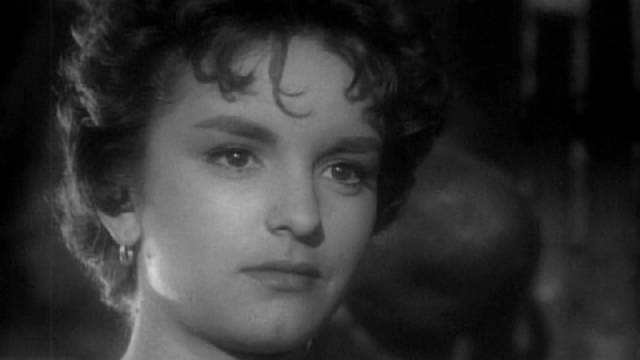
Indicator have taken a break from their recent spate of Mexican genre movies by dipping a little deeper into the Calderón family archives. Untouched (Sombra Verde, 1954) is a torrid romantic melodrama with allegorical notes which trades in the urban noir of a movie like Emilio Fernández’s Victims of Sin (1950) for the primal jungle of Veracruz. Both were produced by Guillermo Calderón and show him pushing against the boundaries of censorship and testing how far cinema could push a frank depiction of sexuality in a society still very much under the sway of the Catholic Church.
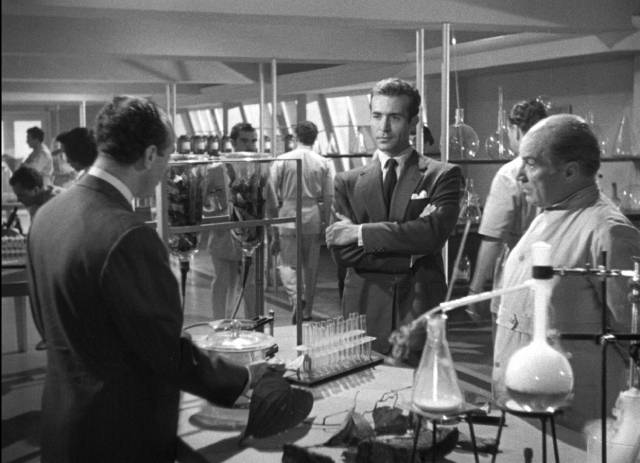
Adapted from a novel by Ramiro Torres Septién, the movie was originally developed by actor-director Norman Foster, who had taken a break from Hollywood in the mid-’40s to make movies in Mexico. However, by the early ’50s the Mexican film unions had cracked down on the hiring of foreign directors and Foster was shut out of the project. In his place Calderón turned to the prestigious Roberto Gavaldón, a filmmaker more concerned with his art than commerce, a difference in attitude which led to conflicts between producer and director, although some of the budget problems faced by the production arose from location shooting in the wilds of Veracruz, where terrain and bad weather caused delays and cost overruns.
To add to the production’s prestige, it would star Ricardo Montalban, who had moved to Hollywood in the mid-’40s and quickly become the epitome of the “Latin lover”. Untouched would mark the return of an international star to the Mexican film business. With only a few weeks to go before the start of shooting, Gavaldón still hadn’t found an actress who satisfied him for the female lead and Calderón stepped in to make a unilateral decision to cast twenty-three-year-old Ariadne Welter who had only just begun her career earlier that year, making an impression in Emilio Fernández’s La rebelion de los colgados (1954). (The next year she would appear in Luis Buñuel’s The Criminal Life of Archibaldo De La Cruz, and would go on to roles in Fernando Mendez’s El vampiro [1957] and The Vampire’s Coffin [1958], not mention appearing as one of the luchadora heroines of Rene Cardona’s The Panther Women [1967].)
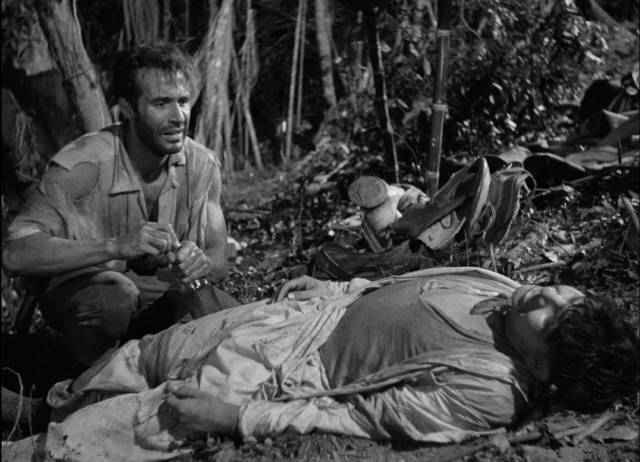
Untouched has an interesting structure which falls into two distinct halves, the first drawing on some familiar conventions – echoing John Hoffman’s Inner Sanctum movie Strange Confession (1945) and Curt Siodmak’s Curucu, Beast of the Amazon (1956). Montalban plays Federico Gascón, an employee of a pharmaceutical company who’s sent into the wilderness to secure a supply of the barbasco root from which a near-miraculous chemical can be extracted. He’s flown to the town of Papantla in Veracruz, but poor planning gets him there during the festival of Corpus Cristi, with the whole town celebrating. Not only are there no available hotel rooms; his guide is involved in a visually spectacular ritual performance involving aerial dancers descending from a very tall pole on spinning ropes. When the man reaches the ground and Federico demands that they leave immediately for the jungle, he’s told that he must wait a couple of days until the festival is over; to do otherwise will bring bad luck.
Too impatient to wait, Federico accepts the offer of Pedro González (Jorge Martínez De Hoyos), a poor family man who assures him that he knows the jungle well. They leave together on horseback for a gruelling trek into the back country along precarious trails teeming with dangerous wildlife. After a number of days, Pedro finally admits that he’s lost, triggering Federico’s suppressed anger. What had been a fairly easy relationship becomes increasingly tense, though Pedro offers some wise words about maintaining a calm perspective; otherwise, the jungle will overwhelm and destroy them.
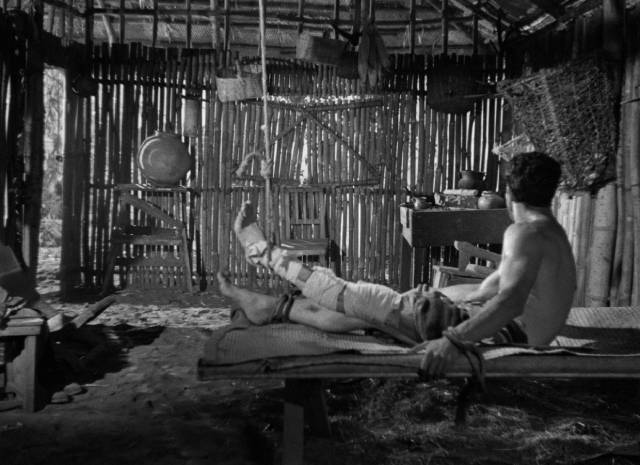
Things go from bad to worse, with Federico close to the breaking point and panicking when they’re stalked by a puma – as he empties his revolver into the undergrowth, Pedro backs away and is bitten by a snake. Although Federico ties a tourniquet around his thigh and tries to suck the poison out of the bite, Pedro dies in minutes. Tying the dead man to their mule, Federico sets out with no idea where he’s going. Which is when a raging storm erupts, dropping a deluge as lighting bolts ignite trees around him, as if trying to drive him somewhere. Although it may not be immediately apparent, this storm carries allegorical weight, a powerful natural force which decisively severs Federico’s connections to his life back in the world. The similarity of his name with that of Ferdinand in Shakespeare’s The Tempest is hardly coincidental.
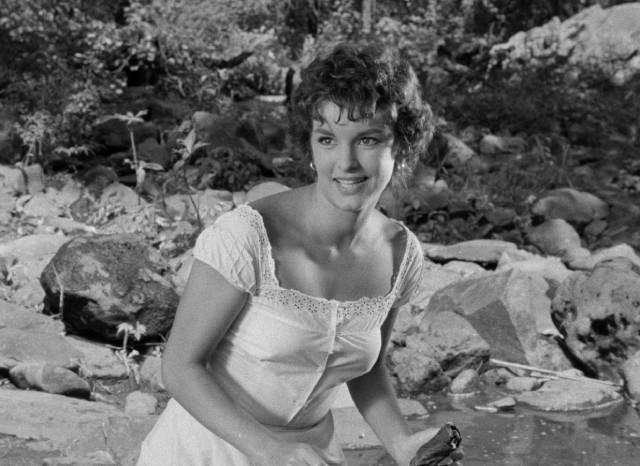
At his lowest moment, exhausted, lacking the strength to go on, Federico hears dogs barking and drags himself a little further until he finds a bridge suspended over a racing river. But as he leads his horse and the mule to which Pedro’s body is tied across the swaying bridge, a man appears and cuts one of the ropes with a machete, plunging Federico and the animals into the rapids. This unfortunately becomes upsetting for non-dramatic reasons as we watch both animals desperately struggling in the water before being swept to their very real deaths over a high waterfall. Federico, however, manages to make it to the rocky shore, where he passes out.
When he comes to, tied to a cot with his injured leg in crude traction, he learns that he is not out of danger because, although rescued from the river, the man who tried to kill him remains hostile. This is Don Ignacio Santos (Victor Parra), who has retreated from the world to this remote place to protect his daughter Yáscara (Ariadne Welter) from, well, life. Young and inexperienced (like Miranda in The Tempest), she is fascinated by the man she found in the river, her fascination rapidly becoming attraction and eventually love – just what her father has tried to keep her away from. (We eventually learn that he was betrayed by the girl’s mother and killed her, and wants Yáscara to have no other attachments than that of daughter to father.)
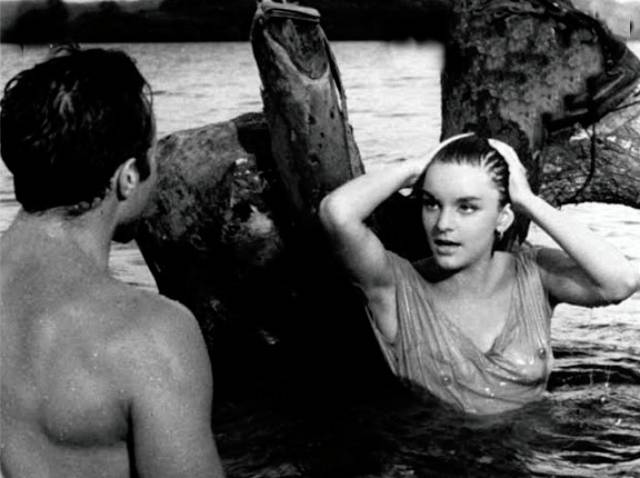
Federico’s trek has left him with only a conceptual tie to his former life, a bourgeois sense of attachment and obligation to the wife he left back there – a woman whom he professes to love, although he describes her in terms of fragility and dependence rather than any deep passion. Here in the jungle, however, passion becomes overwhelming. Unlike the broken women of the urban noir stories – often seduced and abandoned, faced with unwanted children – Yáscara has no social or religious constraints; she possesses a primal sexuality which is expressed with a complete lack of self-censorship. She says what she feels as she feels it with no awareness of the complications this creates for Federico who has internalized society’s rules … rules which conflict with his erotic response to Yáscara, but which are also called upon by her father in an attempt to dissuade the inevitable attachment which quickly grows between his daughter and the stranger.
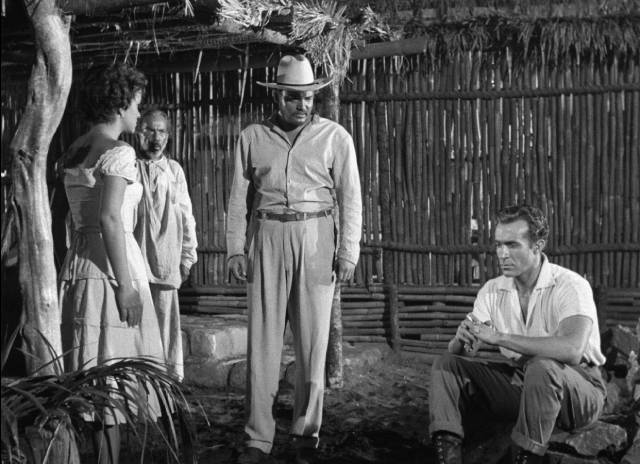
In this conflict between social constraints and sheer animal passion, the former doesn’t seem to stand a chance, and yet the intensity of Yáscara’s emotions takes on a dark, even frightening quality – when it seems that Federico will submit to her father’s pressure and leave, she takes a knife and kills the horses which would take him away and insists that if she’s separated from the man she loves, she’ll kill herself. It all comes to a head when some soldiers arrive, having been sent out to search for the missing man after Pedro’s body washed up downriver. Federico tries to explain his responsibilities to Yáscara, while also expressing his feelings for her and the story ends ambiguously with a spectacular shot as he pauses on the trail and looks back to see her standing precariously at the top of the falls in the distance.
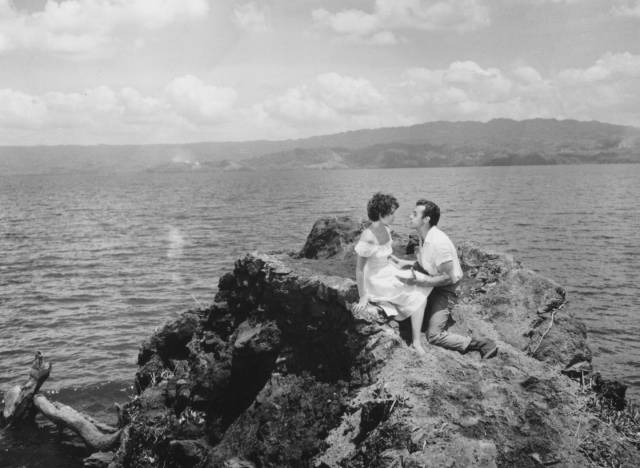
She contemplates throwing herself over the edge, fulfilling her earlier threat, but hesitates as we hear her father’s voice repeating something he said earlier, that if she lets Federico go back to the world where he can choose either to stay or leave his previous life behind and return to the jungle for her, she’ll know without doubt whether he truly loves her. Cutting back to Federico looking up at her, this thought now seems to be implanted in him; he has a choice to make and even though he finally turns away to follow the soldiers, it seems more than likely that he’ll be back, that he’ll reject those obligations imposed by society in favour of something which comes from inside himself.
*
Indicator’s disk was mastered from a 4K restoration, though the source materials aren’t specified. Apart from some minor instances of damage, it looks excellent, with strong contrast and detail. There’s a fascinating documentary element in the early scenes during the festival, while the trek through the jungle has a spectacular visceral quality which climaxes in the violent storm with its multiple lightning strikes and exploding trees. Once Federico reaches the remote settlement, that natural violence is supplanted by the more intimate violence of human emotions driven by an intensely erotic charge which is more frankly depicted than anything Hollywood would have allowed at the time.
Also included on the disk is the English-language version prepared for U.S. release and, not surprisingly, the sexual energy is somewhat tamped down, most obviously in the sequence in which Federico first succumbs to Yáscara’s open desire for him as they cling to each other in the lake, the water making her dress transparent so that her breasts are clearly revealed. But apart from watering down the eroticism, the biggest problem with this version is the awful dubbing with distractingly inappropriate voices.
The disk includes a commentary with film historian David Wilt, plus a couple of interviews – one with film historian Rafael Avina on director Roberto Gavaldón, the other with writer and filmmaker Roberto Fiesco on the careers of Ricardo Montalban and Ariadne Welter. The booklet contains several essays on the film and filmmakers, plus a contemporary article on the production.
This, plus Criterion’s recent edition of Victims of Sin, raises hope that we’ll continue to discover aspects of Mexican cinema which go beyond the conventions of horror and luchadores.
Comments